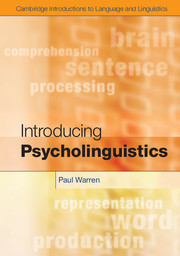Book contents
- Frontmatter
- Contents
- Figures
- Tables
- Preface
- Chapter 1 Introduction
- Chapter 2 Planning utterances
- Chapter 3 Finding words
- Chapter 4 Building words
- Chapter 5 Monitoring and repair
- Chapter 6 The use of gesture
- Chapter 7 Perception for language
- Chapter 8 Spoken word recognition
- Chapter 9 Visual word recognition
- Chapter 10 Syntactic sentence processing
- Chapter 11 Interpreting sentences
- Chapter 12 Making connections
- Chapter 13 Architecture of the language processing system
- Glossary
- References
- Index
Chapter 8 - Spoken word recognition
Published online by Cambridge University Press: 05 November 2012
- Frontmatter
- Contents
- Figures
- Tables
- Preface
- Chapter 1 Introduction
- Chapter 2 Planning utterances
- Chapter 3 Finding words
- Chapter 4 Building words
- Chapter 5 Monitoring and repair
- Chapter 6 The use of gesture
- Chapter 7 Perception for language
- Chapter 8 Spoken word recognition
- Chapter 9 Visual word recognition
- Chapter 10 Syntactic sentence processing
- Chapter 11 Interpreting sentences
- Chapter 12 Making connections
- Chapter 13 Architecture of the language processing system
- Glossary
- References
- Index
Summary
PREVIEW
This chapter introduces some key issues involved in the process of recognising spoken words. You will learn that spoken word recognition:
involves a series of stages, including contact between the input speech and the representations for words stored in the mental lexicon, the activation of these stored representations, and the recognition of a single word as the outcome of this process;
involves both the analysis of the input and the interpretation of the context in which words are encountered;
is affected by how often and how recently words have been encountered, and by their similarity to other words.
Introduction
Words are often regarded as the basic building-blocks of language. Although in theory they are not the minimal unit of meaning, in practice we think of different words as conveying different meanings, and therefore of the word as a unit of meaning. In addition, the ‘first word’ is a landmark in most parents’ appraisals of their children’s language development. Words are what we look up in dictionaries and what we learn for spelling tests. When we learn a second or foreign language, words are what we study on vocabulary lists. A good author is sometimes known as a wordsmith.
- Type
- Chapter
- Information
- Introducing Psycholinguistics , pp. 119 - 138Publisher: Cambridge University PressPrint publication year: 2012

